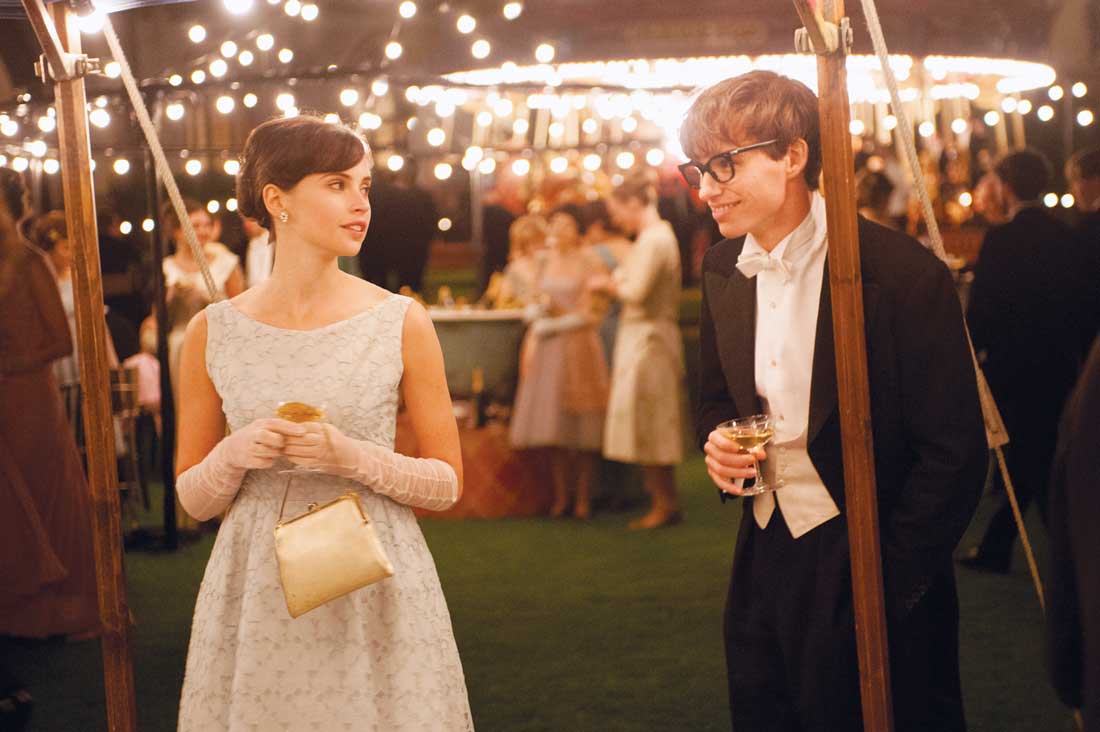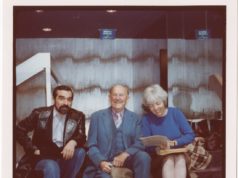We’d all like to know what it’s like to be a genius, but it might well be both easier and more fruitful to make a movie about what it’s like to live with a genius. Not many of us have otherworldly talents at something, but more of us have the experience of knowing that we come second to something else in our partner’s life. The Theory of Everything is based on the memoir of Jane Hawking, the ex-wife of physicist Stephen Hawking, who tells of the difficulties of being overshadowed by her ex’s gifts and the fame that came with them. Sadly, despite two terrific performances, the movie fails to give us that.
The story picks up in 1963, when Stephen (Eddie Redmayne) is a Cambridge graduate student who meets Jane Wilde (Felicity Jones), a fellow student with an interest in Spanish medieval poetry. Soon afterward, Stephen’s life caves in when he’s diagnosed with a motor neuron disease that promises to erode his muscular control until he can no longer breathe on his own. He is given two years to live. Jane sticks with him, vowing to make the most of whatever time they have together and eventually prolonging his life to the present day.
Director James Marsh is the brilliant documentarian who made the Oscar-winning Man on Wire and the even more powerful Project Nim. However, he seems to lose his storytelling instincts when he’s working in fiction, as he is here and in the 2012 spy thriller Shadow Dancer. He and screenwriter Anthony McCarten play fast and loose with the chronology of the Hawkings’ lives, and the movie has too much filler — we don’t need the scene with a doctor giving Stephen his grave diagnosis right before Stephen breaks the same news to one of his classmates (Michael Marcus). The filmmakers also tend to undersell the prankish, schoolboy sense of humor that Stephen Hawking has displayed in his real life, though they do include a gag involving his motorized wheelchair that will particularly tickle Doctor Who fans. If you’re interested in the significance of Hawking’s work, the movie gives you only a thumbnail sketch of his theories. Errol Morris’ 1992 documentary profile of Hawking A Brief History of Time goes much further.
All of this would matter less if the filmmakers succeeded in their main goal, which is to make Jane as interesting to us as the astrophysicist who overcame his disability to theorize on the workings of the universe. Instead, the script irons out everything messy in the Hawkings’ marriage, like the moments Jane describes in her memoir when her husband belittled her work. When Stephen leaves Jane for one of his nurses in the late 1980s, the scene is presented as a mutually accepted logical end, whereas the book retells it as a screaming argument that precipitated a long separation. The Jane character is even saddled with a clunky speech about how she’s stronger than she looks. The movie tries to squeeze drama out of the disconnect between Stephen’s atheism and Jane’s Christianity, but it’s not nearly enough. All in all, Jane comes off as the same noble, self-sacrificing wife that we’ve seen in too many melodramas.
Redmayne is best known as Marius from Les Misérables, and he does some superb technical work to depict Stephen’s physical deterioration. It’s Jones who does the real heavy lifting, though. The tiny British actress with the prominent front teeth conveys all of Jane’s frustration, her dedication, her growing attraction to a church choirmaster (Charlie Cox), and her will to keep Stephen alive after he suffers a hemorrhage in Belgium. Perversely, she gives the better performance here but is destined to be overshadowed by the showier male role.
That could have chimed with a movie that was convincing as a woman’s tale. Instead, it’s another paean to genius, one that turns Stephen Hawking’s undeniably inspiring life story into a motivational poster exhorting us to never give up on life. Its subject’s imagination touches the boundaries of the universe, but The Theory of Everything winds up with a much more limited view.
[box_info]
The Theory of Everything
Starring Eddie Redmayne and Felicity Jones. Directed by James Marsh. Written by Anthony McCarten, based on Jane Hawking’s memoir. Rated PG-13.
[/box_info]












